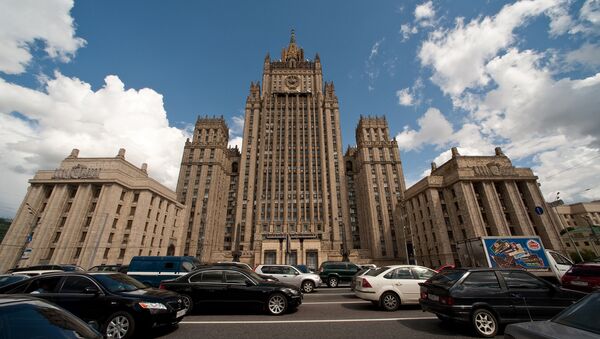VIENNA, November 20 (Sputnik) – The P5+1 talks with Tehran on Iran’s nuclear program are held in an “extremely tense environment” as the time is running out, Russia’s chief negotiator said Thursday.
“The environment at the talks has been extremely tense. Time is running out and talks are being held constantly in various formats,” Russian Deputy Foreign Minister Sergei Ryabkov said.
The final round of Tehran's talks with the group of six world powers comprising Russia, the United States, the United Kingdom, France, China, and Germany, kicked off in Vienna on Tuesday.
The deadline to reach an agreement guaranteeing a peaceful nature of Iranian nuclear program is set for November 24, 2014.
Kerry Arrives in Vienna for Nuclear Talks With Iran
US Secretary of State John Kerry arrived in Vienna Thursday for talks on Iran nuclear proram, the US Department of State said.
.@johnkerry has landed in Vienna for the #IranTalks
— Marie Harf (@marieharf) 20 ноября 2014
In an earlier statement, Harf said Kerry was going to come to the Austrian capital to "check in on Iran talks", just a few days ahead of the final deadline on November 24.
Kerry's arrival is expected to propel the crunch nuclear talks into a more serious direction, an Iranian delegation source told reporters earlier in the day. A breakthrough in the tough nuclear talks depends on Washington's willingness to lift sanctions previously imposed on Tehran, the source added.
Extension of Nuclear Talks With Iran Not Being Discussed So Far
The six nations negotiating with Iran on its controversial nuclear program in Vienna have not yet discussed postponing the deadline for signing an agreement with the Islamic Republic, Russia's chief negotiator at the talks said Thursday.
"No one has spoken about postponing [the deadline]. I think that we will agree before November 24," Russian Deputy Foreign Minister Sergei Ryabkov said.
He added the failure to sign a nuclear agreement with Iran before the November 24 deadline would be a "big mistake with serious consequences."
"Opportunities like that are extremely rare," the Russian negotiator said.
Ryabkov also noted that negotiations were carried out in an extremely tense environment with meetings held non-stop as there was less and less time.
The delegations participating in the talks might need to consult with the capitals to solve the problems hindering the successful outcome of the negotiations, he added.
The International Atomic Energy Agency (IAEA) said earlier today that Iran had not yet submitted any proposals in regard to practical solutions to the disputes surrounding its nuclear program.
Iran's nuclear program has been a matter of concern for many countries, with Western nations accusing Tehran of attempting to develop nuclear weapons under the guise of a civilian nuclear program, which Iranian authorities have denied.
During talks in Geneva in November 2013, the P5+1 group, comprising Russia, China, the United States, the United Kingdom, France and Germany, agreed to reach a long-term comprehensive agreement with Tehran by July, guaranteeing the peaceful nature of the Iranian nuclear program. The deadline for the deal was later extended to November 24, 2014.
Failure at Nuclear Talks With Iran Could Be Grave Mistake
Failure to reach an agreement in nuclear talks with Iran would be a grave mistake that will have serious repercussions, Russian Deputy Foreign Minister Sergei Ryabkov said Thursday.
"This is a rare opportunity and it is a very important moment when losing this chance would become a grave mistake with hard consequences," Ryabkov told reporters.
"From our point of view, everyone should demonstrate maximum responsibility," Russia's chief negotiator said.
Ryabkov added that even an interim deal needed an interim approval and in light of the recent events it was unclear how even an interim accord could be reached.
"This raises most concerns, at least on our part. We call on everyone to pass away secondary, periphery thoughts to think what needs to be done now to undertake the decisions needed as air," the deputy foreign minister concluded.



